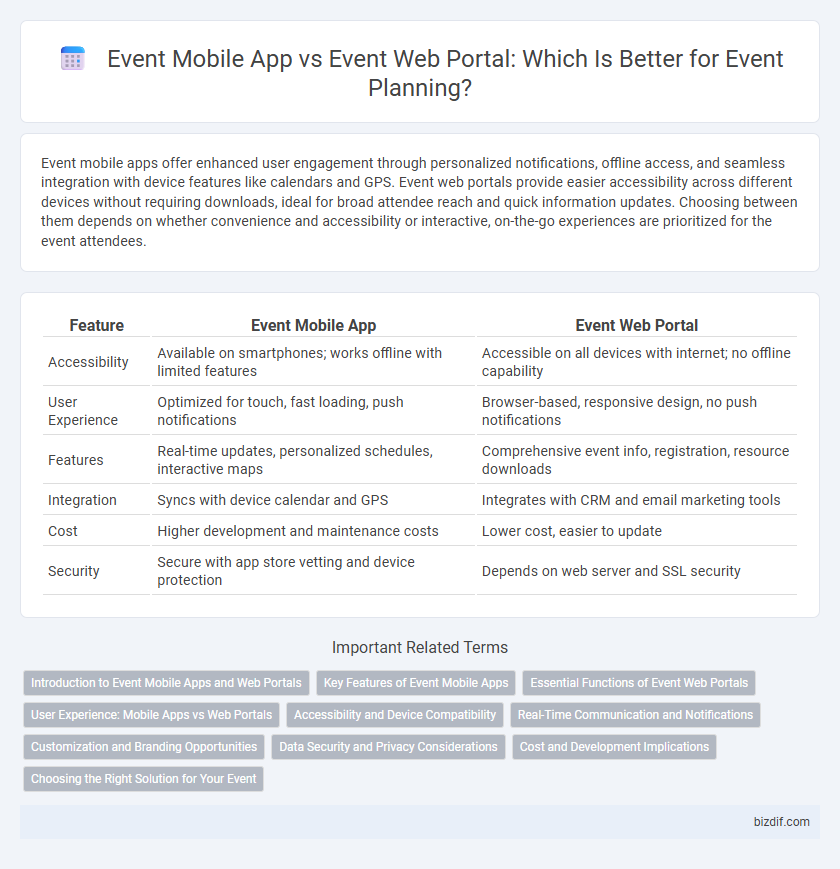Event mobile apps offer enhanced user engagement through personalized notifications, offline access, and seamless integration with device features like calendars and GPS. Event web portals provide easier accessibility across different devices without requiring downloads, ideal for broad attendee reach and quick information updates. Choosing between them depends on whether convenience and accessibility or interactive, on-the-go experiences are prioritized for the event attendees.
Table of Comparison
| Feature | Event Mobile App | Event Web Portal |
|---|---|---|
| Accessibility | Available on smartphones; works offline with limited features | Accessible on all devices with internet; no offline capability |
| User Experience | Optimized for touch, fast loading, push notifications | Browser-based, responsive design, no push notifications |
| Features | Real-time updates, personalized schedules, interactive maps | Comprehensive event info, registration, resource downloads |
| Integration | Syncs with device calendar and GPS | Integrates with CRM and email marketing tools |
| Cost | Higher development and maintenance costs | Lower cost, easier to update |
| Security | Secure with app store vetting and device protection | Depends on web server and SSL security |
Introduction to Event Mobile Apps and Web Portals
Event mobile apps offer seamless on-the-go access to event schedules, personalized agendas, and real-time notifications, enhancing attendee engagement through interactive features like live polls and networking tools. In contrast, event web portals provide a comprehensive platform for registration, detailed event information, and administrative management accessible via desktop browsers. Both solutions optimize event experience but prioritize different user interactions and accessibility needs.
Key Features of Event Mobile Apps
Event mobile apps offer real-time push notifications, seamless attendee engagement through interactive agendas, live polling, and networking features that enhance the event experience. GPS-enabled maps and personalized schedules increase convenience and usability, making it easier for attendees to navigate the event. Integration with social media and in-app messaging fosters communication, while offline access ensures functionality in low connectivity areas.
Essential Functions of Event Web Portals
Event web portals offer comprehensive event management tools including registration, ticketing, and detailed reporting dashboards, enabling organizers to efficiently track attendee data and session analytics. These portals support integrated communication features such as email campaigns, personalized schedules, and community forums that enhance participant engagement before, during, and after the event. Robust access controls and multi-device compatibility ensure secure, seamless user experiences tailored to diverse stakeholder roles and event complexities.
User Experience: Mobile Apps vs Web Portals
Event mobile apps offer a seamless, tailored user experience with offline access, push notifications, and device integration, enhancing real-time engagement and personalized interactions. Web portals provide broader accessibility across devices without installation, supporting detailed content and complex navigation but may lack the responsiveness and speed of mobile apps. Choosing between them depends on prioritizing convenience and interactivity in mobile apps or comprehensive access and functionality in web portals.
Accessibility and Device Compatibility
Event mobile apps provide enhanced accessibility through offline capabilities and push notifications tailored for on-the-go users, ensuring seamless engagement across smartphones and tablets. Event web portals offer broader device compatibility, accessible via any internet-enabled device without installation, catering to diverse user preferences and operating systems. Prioritizing both platforms ensures maximum reach, accommodating attendees who use various devices and require flexible access options.
Real-Time Communication and Notifications
Event mobile apps provide superior real-time communication and instant push notifications, enabling attendees to receive updates and interact instantly from any location. Event web portals offer robust communication features but often rely on browser refreshes or email alerts, resulting in slower response times. Mobile apps enhance engagement through seamless, timely notifications and messaging capabilities vital for dynamic event environments.
Customization and Branding Opportunities
Event mobile apps offer extensive customization options, enabling organizers to tailor the user interface, features, and notifications to align with their brand identity. In contrast, event web portals provide broader accessibility across devices but may have limited branding flexibility compared to mobile apps. Both platforms support branded content, yet mobile apps deliver a more immersive, consistent brand experience through personalized interactions and push notifications.
Data Security and Privacy Considerations
Event mobile apps offer enhanced security features such as biometric authentication and encrypted data storage, reducing risks associated with unauthorized access. Event web portals typically rely on robust SSL encryption and multi-factor authentication to safeguard user information during access from diverse devices. Both platforms must comply with GDPR and CCPA regulations to ensure data privacy, but mobile apps often provide more granular control over data permissions and offline data protection.
Cost and Development Implications
Event mobile apps often require higher development costs due to platform-specific coding for iOS and Android, along with ongoing maintenance and updates. In contrast, event web portals typically involve lower initial expenses and simpler deployment, as they function across all browsers without installation. Choosing between these depends on budget constraints and desired user engagement, with mobile apps offering enhanced interactivity and web portals providing broader accessibility at reduced costs.
Choosing the Right Solution for Your Event
Event mobile apps offer real-time engagement, personalized schedules, and push notifications, enhancing attendee experience and on-site interaction. Event web portals provide easy access across devices without downloads, ideal for detailed content management and pre-event registration. Evaluating event size, audience tech preferences, and required features ensures the optimal choice between mobile apps and web portals for seamless event management.
Event mobile app vs Event web portal Infographic

 bizdif.com
bizdif.com